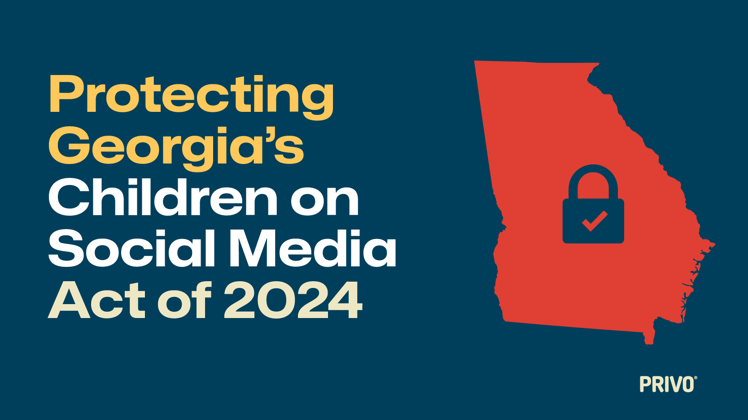
How to Comply with the Protecting Georgia’s Children on Social Media Act
Last updated: July 27, 2025
Georgia’s Governor, Brian P. Kemp, signed the Protecting Georgia’s Children on Social Media Act of 2024 (Act 463) into law in April. Online services that fall under scope need to meet the requirements or face enforcement actions and fines. The law requires children younger than 16 to have their parents’ explicit permission to join social media and requires pornographic sites to verify that users are 18 or over. The law also requires the Department of Education and local school boards to adopt policies on social media, cyberbullying, and internet usage.
“We cannot continue to sit by and do nothing as young Georgians develop addictions and disorder and suffer at the hands of online antagonists," said Kemp.
A number of other states including Arkansas, Florida, Louisiana, Ohio, Texas and Utah passed laws requiring parental consent for children to use social media and age verification to prevent children from accessing porn but these have hit roadblocks, all being legally challenged. Now Georgia’s regulation has faced the same push back and a federal judge has blocked the enforcement. You can read the Judge's full opinion here.
What you need to know
Effective Date:
Originally July 1, 2025, but there is a preliminary injunction.
Key Requirements:
- Social media services would have to use “commercially reasonable efforts” to verify someone's age.
- Services would have to treat anyone who can't be verified as a minor.
- Parents or guardians of children younger than 16 would have to give their express consent to their children joining a service.
- The provider of a social media platform shall make available, upon the request of a parent or guardian of a minor, a list and description of the features offered by the social media platform related to censoring or moderating content available on the social media platform, including any features that can be disabled or modified by an account holder.
- For a minor account holder, the provider of a social media platform shall prohibit all of the following:
- The display of any advertising in the minor account holder's account based on such minor account holder's personal information, except age and location; and
- The collection or use of personal information from the posts, content, messages, text, or usage activities of the minor account holder's account other than what is adequate, relevant, and reasonably necessary for the purposes for which such information is collected, as disclosed to the minor.
- Ban social media use on school devices.
- Websites whose content is comprised of over a third (more than 33.33 percent) of material that is harmful to minors to verify that their users are age 18 or older using a reasonable age verification method
- When a commercial entity or third party performs a reasonable age verification, the commercial entity shall not retain any identifying information after access to the material has been granted.
- Mandate additional education by schools on social media and internet use.
- The Department of Education shall develop model programs for educating students regarding online safety while using the internet.
Who needs to comply?
- Social media platforms that are defined as an online forum that allows an account holder to create a profile, upload posts, view and listen to posts, form mutual connections, and interact publicly and privately with other account holders and users.
- Websites whose content is comprised of over a third of material that is harmful to minors.
- Local school boards and charter schools to annually submit acceptable-use policies and technology protection measures to the State Board of Education. Schools must have suitable technology protection measures to prevent access to harmful material.
Who does NOT need to comply?
- An online service, website, or application where the predominant or exclusive function is any of the following:
-
-
- Email;
- A service that, pursuant to its terms of use, does not permit minors to use the platform and utilizes commercially reasonable age assurance mechanisms to deter minors from becoming account holders;
- A streaming service that provides only licensed media that is not user generated in a continuous flow from the service, website, or application to the end user and does not obtain a license to the media from a user or account holder by agreement to its terms of service;
- News, sports, entertainment, or other content that is preselected by the provider and not user generated, and any chat, comment, or interactive functionality that is provided incidental to or directly or indirectly related to such content;
- Online shopping or ecommerce, if the interaction with other users or account holders is generally limited to the ability to upload a post and comment on reviews, the ability to display lists or collections of goods for sale or wish lists, and other functions that are focused on online shopping or ecommerce rather than interaction between users or account holders;
- Interactive gaming, virtual gaming, or an online service, website, or application that allows the creation and uploading of content for the purpose of interactive gaming, educational entertainment, or associated entertainment, and communications related to that content;
- Photograph editing that has an associated photograph hosting service if the interaction with other users or account holders is generally limited to liking or commenting;
- Single-purpose community groups for public safety if the interaction with other users or account holders is limited to that single purpose and the community group has guidelines or policies against illegal content;
- Teleconferencing or videoconferencing services that allow reception and transmission of audio and video signals for real-time communication;
- Shared document collaboration;
- Permitting comments on a digital news website if the news content is posted only by the provider of the digital news website;
- Providing or obtaining technical support for a platform, product, or service;
- Peer-to-peer payments, provided that interactions among users or account holders are generally limited to the ability to send, receive, or request funds; like or comment on such transactions; or other functions related to sending, receiving, requesting, or settling payments among users or account holders.
-
To see the comprehensive list of which entities are exempt, view the Bill starting on page 23.
Enforcement:
- The Attorney General may initiate an action and seek damages for up to $2,500.00 for each violation of the regulation.
- A commercial entity whose website content is comprised of over a third (more than 33.33 percent) of material that violates the Code section 3-2 is liable to an individual for damages resulting from a minor accessing material harmful to minors, including court costs and reasonable attorneys' fees as ordered by the court. A commercial entity that violates this Code section shall be subject to a fine of up to $10,000.00 for each violation.
- Schools who fail to provide such measures required could result in withholding of state funds.
How can your business comply with Georgia’s Act 463 requirements?
PRIVO’s specialized suite of cloud-based solutions and expert services were engineered specifically to address minors online addressing the entire spectrum of age, identity and privacy needs for companies whose business objectives involve engaging directly or indirectly with minors, offering stand-alone micro services.
Contact us to learn more and to see a demo of our easy to implement compliant smart age gate, age verification and parental consent services to help your company comply with Act 463 and other state, federal and international regulations.
For more information about Act 463:
>> View the bill by clicking here


 Blog
Blog






 Facebook
Facebook Linkedin
Linkedin Blog
Blog

 Twitter
Twitter

